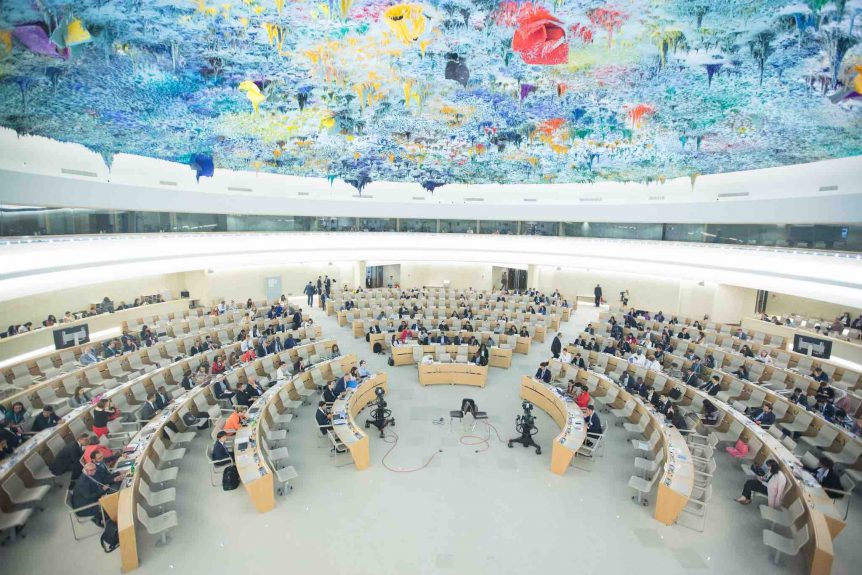
2 June, 2020
Guaranteeing civil society participation at the resumed 43rd session and upcoming 44th session of the Human Rights Council.
This letter was first published by the Cairo Institute for Human Rights Studies
Ambassador Elisabeth Tichy-Fisslberger,
President of the United Nations Human Rights Council
Madam President,
The undersigned human rights organizations would like to thank you and your office for the measures taken so far to continue the work of the Human Rights Council and its mechanisms amid the challenging circumstances we are currently facing with the COVID-19 pandemic.
We appreciate the efforts made to resume the 43rd session of the Human Rights Council as well as to hold the 44th session in the coming weeks. However, we would like to express our concerns regarding modalities of civil society participation and call on the HRC Presidency to ensure equitable and adequate civil society participation, especially for organizations coming from the Global South or regions still deeply affected by the pandemic.
This crisis cannot be used as a way to limit civil society participation, and measures taken to ensure the continuity of the Council’s sessions must not restrict nor be a setback to the work carried out by those who support victims of human rights violations.
As the Council moves to host an in-person meeting in Geneva, many defenders and representatives from civil society organizations will not be able to travel due to concerns over health and restrictions of movement posed by the pandemic. In light of this, we would like to share with you and your office several measures and suggestions to take into account to ensure civil society participation at the resumed 43rd and 44th sessions of the Human Rights Council:
- Enable remote participation of civil society representatives in all Council meetings, including the possibility of speaking through pre-recorded statements, at Interactive Dialogues, General Debates, UPR adoptions, Panels, etc;
- Ensure an adequate balance in NGOs’ oral interventions between representatives attending the meeting in-person and remotely, as well as guarantee a balance of representation between organizations coming from different regions;
- Should restrictions to the limit of delegates be imposed on access to the Palais des Nations, guarantee equitable participation of NGO representatives to access the Assembly Hall or other meeting rooms where the session might take place;
- Webcast all Council meetings and guarantee simultaneous interpretation into all official languages of the United Nations;
- Publicize and communicate in due time all Council related documents and any changes related to its meetings, taking into account the different time zones in which representatives may follow the session;
- Publicize information and ensure civil society participation, both in person and remotely through webcasting, to Council-related meetings that might not take place in the Palais des Nations such as informals, side events, dialogues with the High Commissioner, etc.;
- Consult with civil society prior to any establishment of norms or measures taken that can affect the functioning of the Council and its meetings;
- Guarantee that the modalities of remote participation for civil society representatives and human rights defenders are safe and that all necessary measures are taken to protect those who may be facing restrictions or reprisals because of their engagement with the Council and its mechanisms.
We would like to highlight once again that the measures taken under these difficult circumstances must not be a setback to civil society participation. Thank you for your attention to our concerns and we remain available should you have any queries or to discuss any other suggestions.
Yours sincerely,
- Conectas Direitos Humanos
- CIVICUS: World Alliance for Citizen Participation
- International Service for Human Rights
- DefendDefenders (East and Horn of Africa Human Rights Defenders Project)
- Centro de Estudios Legales y Sociales (CELS)
- Movimento Nacional de Direitos Humanos MNDH Brasil
- Articulação para o Monitoramento dos Direitos Humanos no Brasil
- Instituto de Desenvolvimento e Direitos Humanos – IDDH
- Conselho Indigenista Missionário – CIMI
- Associação Brasileira de Lésbicas, Gays, Bissexuais, Travestis, Transexuais e Intersexos – ABGLT
- Asian Forum for Human Rights and Development (FORUM-ASIA)
- Commonwealth Human Rights Initiative (CHRI)
- Franciscans International
- FIAN International
- Peace Brigades International
- Red Internacional de Derechos Humanos Suiza RIDH
- Red Internacional de Derechos Humanos Europa AISBL
- Cairo Institute for Human Rights Studies (CIHRS)
- Human Rights Watch



